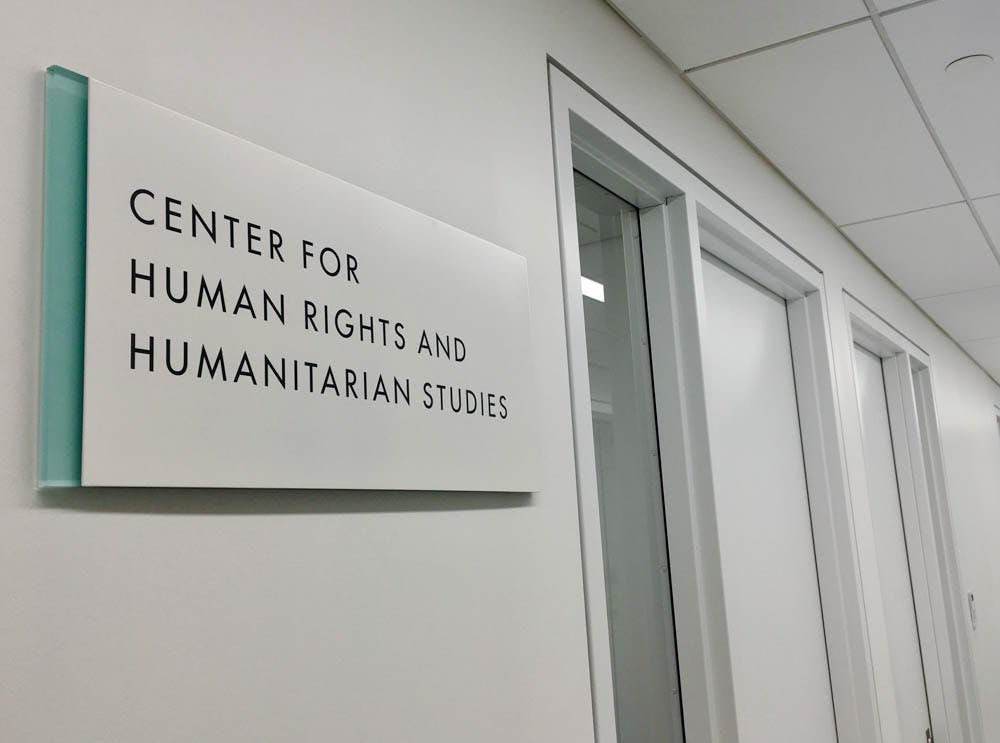The Center for Human Rights and Humanitarian Studies opened its doors at the Watson Institute for International and Public Affairs in September. As a newly endowed center, CHRHS plans to promote research and education on humanitarian issues and human rights concerns, said CHRHS Director Adam Levine.
The center’s mission “is to promote a more just, peaceful, and secure world by furthering a deeper understanding of global human rights and humanitarian challenges and encouraging collaboration between local communities, academics and practitioners to develop innovative solutions to these challenges,” Levine said.
CHRHS replaces the Humanitarian Innovation Initiative, called HI2 for short, which began in 2016. “We always had in mind that we wanted to grow (HI2) to become a center,” said Seth Stulen, CHRHS program manager.
Unlike its predecessor, CHRHS is a permanent center and has its own $8.5 million endowment. CHRHS also receives slightly more annual funding from the University than HI2 did, which “goes into expanding program faculty to support the center’s work,” Levine said.
One of the hallmarks of the new center is its focus on human rights in addition to humanitarian issues, Stulen said. “We have yet to find another university that is looking at these two fields in a single academic center.”
Levine said human rights involves “protection for individuals” against harm — such as extrajudicial killings and torture — from both governments and non-governmental entities. Human rights also include quality of life rights, such as access to clean water and food, he added. Humanitarianism, on the other hand, “refers to the efforts to reduce the impact of disasters” like flood, disease and warfare.
CHRHS’s mission is important because “human rights violations are most likely to occur in disaster or conflict settings,” like the ones that humanitarian organizations focus on, Levine said. By studying the intersection of human rights and humanitarianism, the center hopes to develop a “rights-based approach to humanitarian aid,” he added.
The center plans to use its increased funding to continue and expand its research efforts, both at the University and abroad. One major CHRHS study is working to examine civilian-military coordination during humanitarian crises in Jordan, the Democratic Republic of the Congo and the Philippines. This work also receives funding from the Gates Foundation, the Carnegie Corporation of New York and the U.S. State Department, among other organizations, Levine said.
Additionally, the center provides seed funding for research conducted by University students, faculty and alums as well as several other researchers connected with CHRHS around the world, Levine added.
CHRHS plans to continue hosting events to involve students with humanitarian work, such as a hackathon called Hack for Humanity, which HI2 began hosting in March 2018, Levine said. Hack for Humanity is “a really exciting and interesting way for students to engage in humanitarian work and gain some experience tackling some of the challenges that exist” in the field of humanitarianism, he explained. The hackathon gives teams of students an opportunity to develop strategies for responding to current humanitarian crises.
This semester, CHRHS also started a new speaker series called the Human Security Seminar, which brings humanitarian experts to the University, Stulen said.
In addition, the center has partnered with leading humanitarian organizations — such as Human Rights Watch, the International Crisis Group and the World Health Organization — to offer University students funded summer internship opportunities in humanitarian work, said CHRHS student assistant Rakhi Kundra ’21.
In the transition from HI2, CHRHS retained a valuable network of humanitarian scholars from around the world, Kundra said. The center collaborates with a long list of fellows and advisers, ranging from faculty and scholars of humanitarian issues to directors of large-scale humanitarian efforts, according to its website.
Layla Beckhardt ’20, another student assistant at CHRHS, said she feels that the center is an important vehicle for combating “scholarly pessimism,” which is the perception that human rights are eroding and that plans to improve them are futile. “CHRHS is so important so that we can invest in research and demonstrate that things are looking up, that things are positive,” she said. “You need to have hope to continue fighting for something, and not just pessimism that everything is going terribly.”





